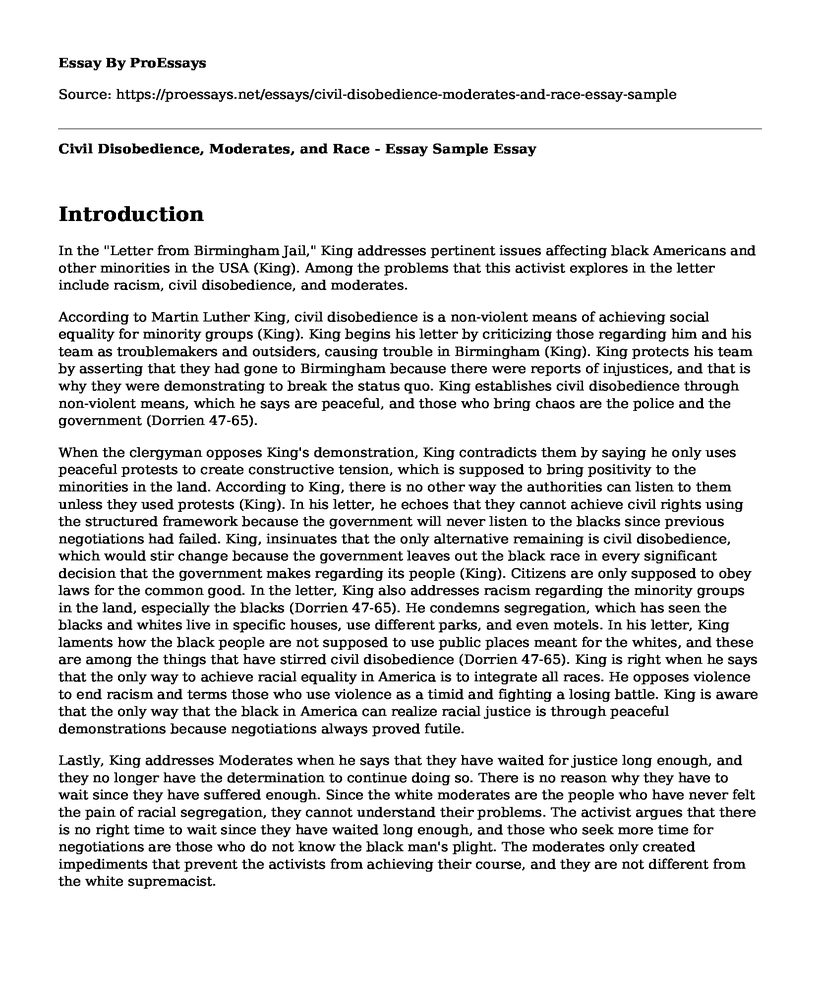Introduction
In the "Letter from Birmingham Jail," King addresses pertinent issues affecting black Americans and other minorities in the USA (King). Among the problems that this activist explores in the letter include racism, civil disobedience, and moderates.
According to Martin Luther King, civil disobedience is a non-violent means of achieving social equality for minority groups (King). King begins his letter by criticizing those regarding him and his team as troublemakers and outsiders, causing trouble in Birmingham (King). King protects his team by asserting that they had gone to Birmingham because there were reports of injustices, and that is why they were demonstrating to break the status quo. King establishes civil disobedience through non-violent means, which he says are peaceful, and those who bring chaos are the police and the government (Dorrien 47-65).
When the clergyman opposes King's demonstration, King contradicts them by saying he only uses peaceful protests to create constructive tension, which is supposed to bring positivity to the minorities in the land. According to King, there is no other way the authorities can listen to them unless they used protests (King). In his letter, he echoes that they cannot achieve civil rights using the structured framework because the government will never listen to the blacks since previous negotiations had failed. King, insinuates that the only alternative remaining is civil disobedience, which would stir change because the government leaves out the black race in every significant decision that the government makes regarding its people (King). Citizens are only supposed to obey laws for the common good. In the letter, King also addresses racism regarding the minority groups in the land, especially the blacks (Dorrien 47-65). He condemns segregation, which has seen the blacks and whites live in specific houses, use different parks, and even motels. In his letter, King laments how the black people are not supposed to use public places meant for the whites, and these are among the things that have stirred civil disobedience (Dorrien 47-65). King is right when he says that the only way to achieve racial equality in America is to integrate all races. He opposes violence to end racism and terms those who use violence as a timid and fighting a losing battle. King is aware that the only way that the black in America can realize racial justice is through peaceful demonstrations because negotiations always proved futile.
Lastly, King addresses Moderates when he says that they have waited for justice long enough, and they no longer have the determination to continue doing so. There is no reason why they have to wait since they have suffered enough. Since the white moderates are the people who have never felt the pain of racial segregation, they cannot understand their problems. The activist argues that there is no right time to wait since they have waited long enough, and those who seek more time for negotiations are those who do not know the black man's plight. The moderates only created impediments that prevent the activists from achieving their course, and they are not different from the white supremacist.
Conclusion
In conclusion, King led civil activists into opposing what he termed as perpetual racial injustices that the black minorities have faced since the beginning. He argues that the only option to get the government into listening to them is through civil disobedience, which is peaceful protests. King sees segregation as suppressing the blacks, and the only alternative to eradicate the problem was embracing the integration of all races in the community. Moderates were the impediments to King's quest for justice because there was no time to wait since the Blacks had suffered enough.
Works Cited
King, Martin Luther. The Radical King. Vol. 11. King Legacy (Hardcover), 2015.
Dorrien, Gary. "The Radical King: Democratic Socialism, Personal Idealism, Anti-Militarism, and Black Power." Telos 2018.182 (2018): 47-65.
Cite this page
Civil Disobedience, Moderates, and Race - Essay Sample. (2023, May 19). Retrieved from https://proessays.net/essays/civil-disobedience-moderates-and-race-essay-sample
If you are the original author of this essay and no longer wish to have it published on the ProEssays website, please click below to request its removal:
- The Devil in the Shape of a Woman: Book Review
- Sojourner Truth's "Ain't I a Woman" Essay
- Race During the Industrial Revolution Essay
- Essay Sample on Ethnicity and Racism in Canada
- We Are in Fact Animals Essay Example
- Gods and Goddesses in the Iliad Essay Example
- Research Paper on Discrimination Based on Sexual Orientation: What It Is and Why It's Wrong







